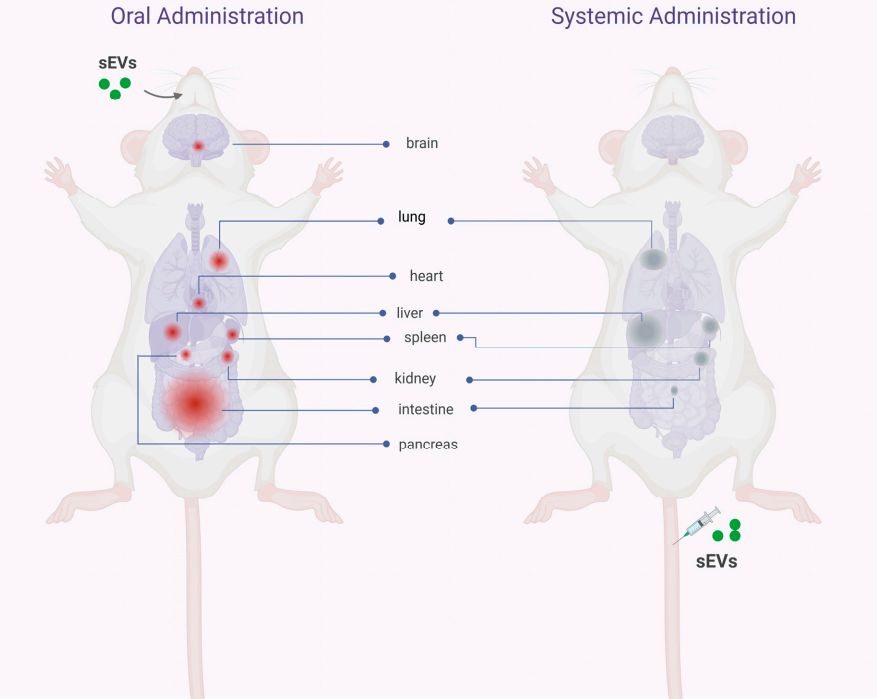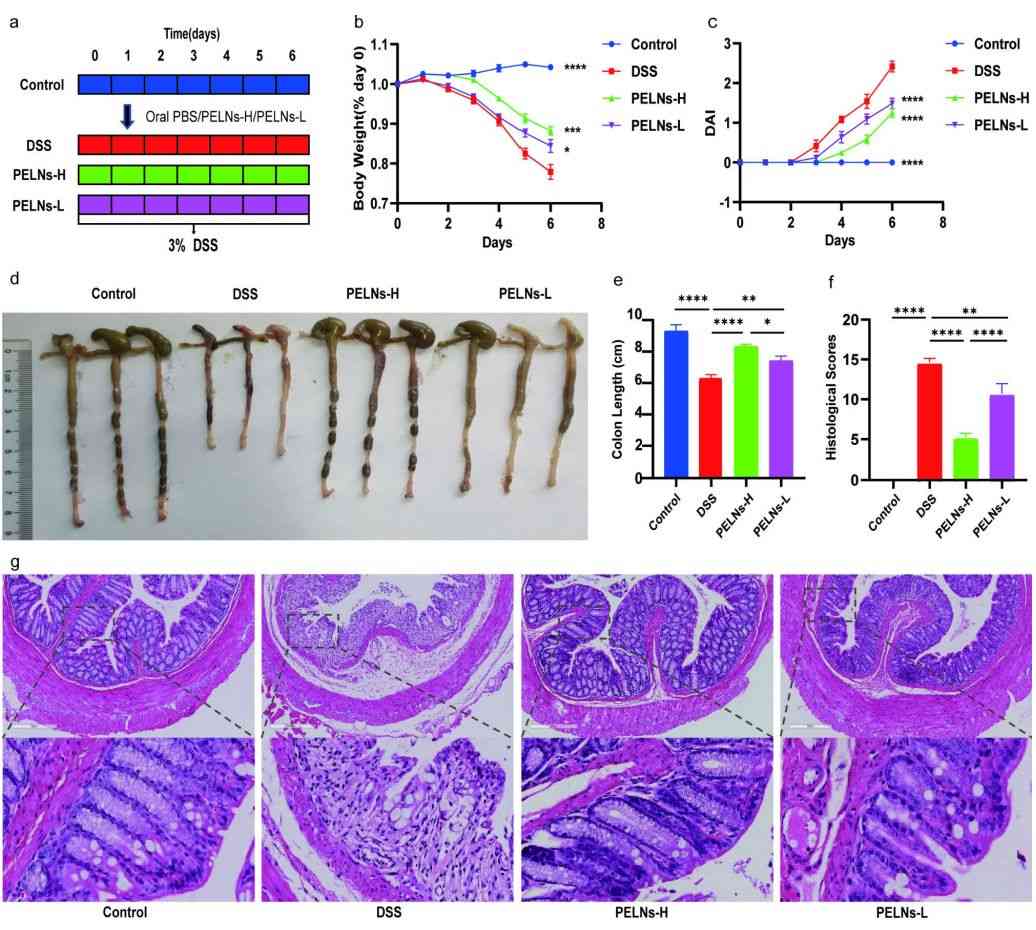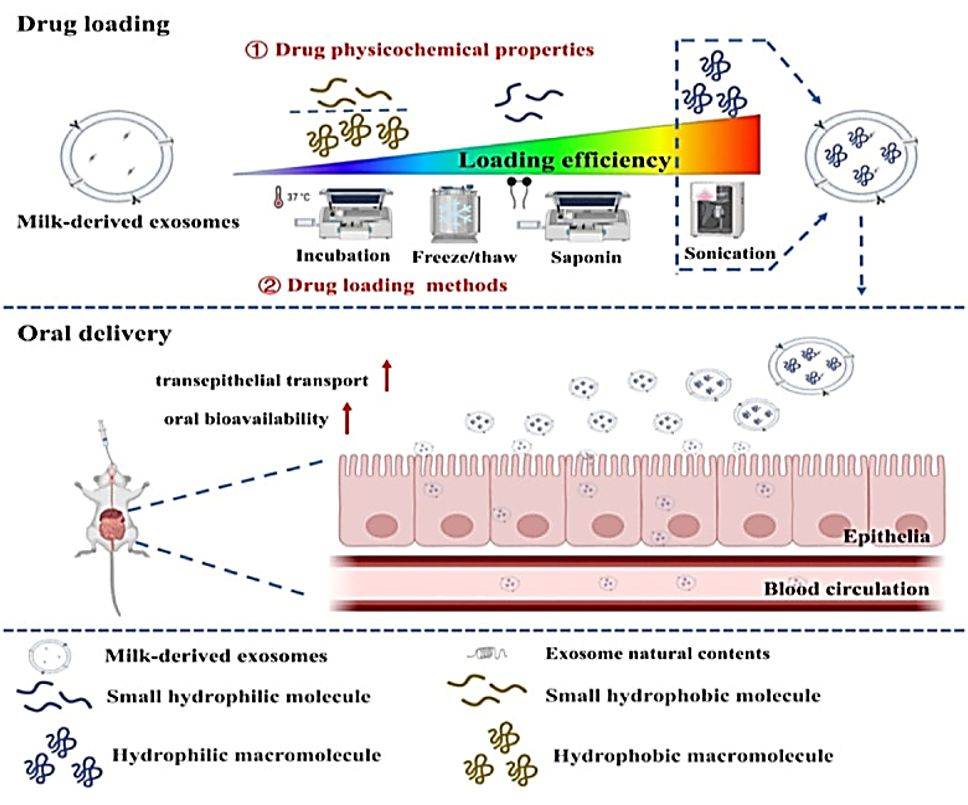Oral Exosomes
Exosomes are cell-secreted nanovesicles that have emerged as a promising therapeutic agent due to their ability to deliver bioactive molecules to target cells. Although intravenous injection is the main route of exosome delivery, oral administration offers significant advantages, especially in the treatment of gastrointestinal and systemic diseases.
 Figure 1. Comparison of biological distribution patterns of orally and IV-administered exosomes. (Donoso-Meneses D, et al., 2023)
Figure 1. Comparison of biological distribution patterns of orally and IV-administered exosomes. (Donoso-Meneses D, et al., 2023)
Therapeutic Applications of Oral Exosomes
Oral exosomes are expected to treat a wide range of diseases, particularly those affecting the gastrointestinal tract and systemic diseases.
Gastrointestinal Diseases - Oral exosomes can be used to deliver therapeutic agents to the intestines for the treatment of inflammatory bowel disease (IBD), irritable bowel syndrome (IBS), and gastrointestinal cancers. They modulate inflammation, promote tissue repair, and deliver anti-cancer drugs directly to tumor sites.
Metabolic Diseases - Oral exosomes are used to treat diabetes, obesity, and NAFLD. Exosomes deliver insulin sensitizers, regulate lipid metabolism, and promote pancreatic β cell function.
Infectious Diseases - Oral exosomes can be used to deliver antiviral or antimicrobial agents to the intestinal tract, targeting infections such as gastroenteritis and antibiotic-resistant bacteria.
Immunomodulation - Oral exosomes modulate the immune system and may treat autoimmune diseases such as Crohn's disease and rheumatoid arthritis.
Drug Loading Methods for Oral Exosomes
Effective loading of drugs into exosomes is critical for oral administration. Several methods have been developed to encapsulate therapeutic agents within exosomes.
| Methods | Details |
| Passive Loading | This method utilizes the natural properties of exosomes to encapsulate hydrophobic drugs during their biogenesis. However, this method typically results in inefficient loading and limited control over drug encapsulation. |
| Electroporation | This technique uses electrical impulses to temporarily permeate the exosome membrane to allow drug entry. This technique has moderate loading efficiency and can be used for both hydrophobic and hydrophilic drugs. |
| Ultrasonication | This method uses ultrasound to disrupt the exosome membrane and facilitate drug loading. This method has high loading efficiency but may damage the exosome. |
| Extrusion | This technique forces the exosome through the pore membrane and encapsulates the drug within the lumen. This technique has high loading efficiency and minimizes damage to exosomes. |
| Click Chemistry | This method utilizes a biocompatible reaction to covalently attach the drug to exosome surface molecules, ensuring stable drug encapsulation and targeted delivery. |
Cases
- Oral Administration of Amaranthus Exosome-like Nanoparticles Relieves DSS-induced Colitis
Plant-derived exosome-like nanoparticles (PDEN) have received significant attention in the treatment of ulcerative colitis (UC). Researchers isolated and characterized exosome-like nanoparticles (PELN) from edible Amaranthus vulgaris, which have an ideal nanoscale and negative zeta potential. Oral administration of PELN effectively inhibited the expression of pro-inflammatory cytokines and myeloperoxidase, increased the level of anti-inflammatory cytokines (IL-10), and alleviated dextran sodium sulfate (DSS)-induced acute colitis in mice.
 Figure 2. Oral administration of PELN protects mice against colitis. (Zhu MZ, et al., 2023)
Figure 2. Oral administration of PELN protects mice against colitis. (Zhu MZ, et al., 2023)
- Milk Exosomes Could Serve as a Highly Potential Oral Drug Delivery System
Substances such as proteins and small molecule drugs can be loaded into milk exosomes or onto exosome membranes. To date, milk exosomes have been used as drug carriers for the treatment of many diseases, including lung cancer, diabetes, breast cancer, ovarian cancer, and oral squamous cell carcinoma. In addition to being used as oral drug carriers for the treatment of diseases, milk exosomes also have preventive and therapeutic effects on certain diseases, preventing colorectal cancer and having anti-inflammatory effects. In addition, milk exosomes have certain antiviral abilities, which opens up a new way for the research of treating viral diseases based on milk-derived exosomes.
 Figure 3. Milk exosomes as carriers for oral delivery of hydrophilic biomolecule drugs. (Li Y, et al., 2023)
Figure 3. Milk exosomes as carriers for oral delivery of hydrophilic biomolecule drugs. (Li Y, et al., 2023)
Advantages of Oral Exosomes
- Convenience and Patient Compliance - Oral administration is non-invasive and convenient, and patients can easily self-administer the drug, thus improving patient compliance.
- Prevents Degradation - The gastrointestinal tract provides a protective environment for exosomes from degradation by enzymes and immune cells.
- Targeted Delivery to the Gut - Exosomes can be specifically targeted to the intestinal lining, providing localized delivery of therapeutic agents.
- Systemic Absorption - Exosomes can be absorbed from the gut into the bloodstream, providing systemic delivery of therapeutic agents.
- Reduced Side Effects - Oral administration minimizes systemic side effects associated with intravenous administration.
Challenges of Oral Administration of Exosomes
Despite its promise, oral exosomes face several challenges.
- Stabilization of Exosomes in the Gastrointestinal Tract
Exosomes are susceptible to degradation by gastric acid and digestive enzymes, so strategies are needed to protect them during passage through the gut.
- Efficient Drug Loading and Release
The development of efficient drug loading and controlled release in the gut is critical for therapeutic efficacy.
- Preclinical and Clinical Studies
Extensive preclinical and clinical studies are needed to determine the safety and efficacy of oral exosomal delivery.
Today We Offer
Oral exosome administration offers a promising new route for the treatment of a wide range of diseases. Its convenience, targeted delivery, and potential for systemic absorption make it a strong alternative to traditional routes. Ongoing research and development efforts are essential to overcome current challenges and realize the full therapeutic potential of oral exosome administration.
Creative Biostructure provides clients with a comprehensive range of exosome products and exosome solutions to explore the application of exosome administration orally. Feel free to contact us for a formal quote.
References
- Donoso-Meneses D, et al. Oral Administration as a Potential Alternative for the Delivery of Small Extracellular Vesicles. Pharmaceutics. 2023. 15(3): 716.
- Zhu MZ, et al. Edible exosome-like nanoparticles from portulaca oleracea L mitigate DSS-induced colitis via facilitating double-positive CD4+CD8+T cells expansion. J Nanobiotechnology. 2023. 21(1): 309.
- Li Y, et al. Milk-derived exosomes as a promising vehicle for oral delivery of hydrophilic biomacromolecule drugs. Asian J Pharm Sci. 2023. 18(2): 100797.